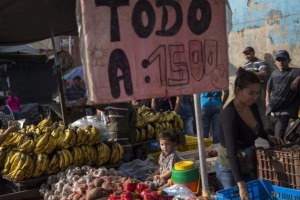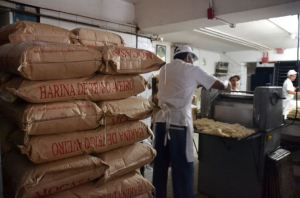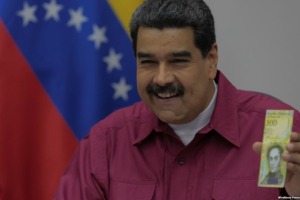nsnbc : Venezuela’s Congress reports that the inflation rate has reached quadruple digits and that the inflation rate in 2017 will top some 2,000 percent. The opposition-controlled legislature reported that inflation reached quadruple digits with consumer prices rising by a whopping 1,369 percent between January and November 2017.
 Congress began publishing its own data on inflation after the socialist party (PSUV) administration stopped releasing them. Venezuela’s central bank reported an inflation of 180 percent in 2015 and 240 percent in 2016 which so far had been the highest on record. The central bank and the administration of President Nicolas Maduro have since stopped providing detailed inflation figures.
Congress began publishing its own data on inflation after the socialist party (PSUV) administration stopped releasing them. Venezuela’s central bank reported an inflation of 180 percent in 2015 and 240 percent in 2016 which so far had been the highest on record. The central bank and the administration of President Nicolas Maduro have since stopped providing detailed inflation figures.
Congress reported that prices rose by 56.7 percent in November. The legislators also reported that they expect that 2017 inflation would top a whopping 2,000 percent. Monetary liquidity grew 14 percent in a single week of November, according to official data, its steepest rise since the central bank began keeping records in 1940.
OPEC member Venezuela was struck by a severe economic crisis when oil prices slumped in 2014 leading to shortages of food and medicines, among others. The socialist party (PSUV) administration of President Nicolas Maduro is blaming the crisis on an alleged economic war against Venezuela, allegedly led by the United States, and allegedly in collaboration with members of the opposition.
The United States has implemented some limited economic sanctions against a number of Venezuelan companies and individuals, but most independent analysts and economists, even the majority of those who are favorably biased for Venezuela’s socialist party, agree that the sanctions, in no way, shape or form explain the severity of the crisis that plagues the country’s economy.
Maduro claims business leaders are arbitrarily inflating prices to destabilize his government. Critics say an unchecked expansion of the money supply has debased the bolivar currency. Crack downs by the PSUV administration resulted in at times grotesque measures that further aggravated the crisis by destroying small to medium sized private enterprises including bakeries.

A “ruthless economic war against Venezuela” and “misuse of subsidized flour”, or a “heavy-handed response to bakeries’ coping with a failed Soviet-style economic model”? Depends on whom you are asking. Photo courtesy SUNDDE
In March 2017, for example, Venezuelan authorities expropriated two bakeries in Caracas over alleged irregularities including the alleged misuse of subsidized flour for non-subsidized products and for defrauding consumers, among others. The controversial move pitted those who claim Venezuela is the “victim of an economic war” against those who believe an increasingly dictatorial PDSV government “seized” an opportunity to put bakeries under State / party control.
Sintra-Harina, Venezuela’s largest federation of bakeries denounced the seizure of the bakeries by the government as “heavy handed” and stressed that the government is not importing enough wheat. Sintra-Harina head Juan Crespo told reporters that Venezuela needs some 120 tons of wheat a day to satisfy consumer demand. He claimed current import rates aren’t meeting this target. He brought it to the point when he said “If you don’t have wheat, you don’t have flour, and if you don’t have flour, you don’t have bread”.
Other bakers denounced the demand that “production must be continuous” as preposterous. The only facilities where bread is produced 24 hours per day are bread factories, not small bakeries. Moreover, many are asking “when small bakeries run out non-subsidized flour for non-subsidized products, what are they supposed to do then, stop production all together – go bankrupt? – Be swallowed up by a Soviet-style state monopolistic capitalism under party control?”
However, the socialist PDSV government claimed there is “enough flour to go around”. Contreras dismissed allegations about heavy-handed interference and fell back to the PDSV’s standard fallback position – blame other for a failed business model. Contreras accused bakeries of buying flour at subsidized rates and of then refusing to produce basic goods subject to price controls.

Maduro proposes crypto currency dubbed “petro”. One possible advantage would be that one doesn’t have to use a wheel barrel to transport money when buying a loaf of bread.
Mis-management, disruption of essential private businesses over perceived, even minor irregularities, the PDSV administration’s failure with regard to diversification before the crisis hit, over-regulation as knee-jerk response to the economic crisis and claims about conspiracies and economic war instead of a consolidation of the economy in cooperation with other parties – instead of a constitutional change, some say constitutional coup – and a crack down on opposition and dissent are driving the crisis.
‘More hunger and misery is on the way for our already beaten-down population,’ said opposition deputy Angel Alvarado, who presented the report. Economists generally say that a country is in hyperinflation when the monthly rate tops 50 percent for three months or annual rates remain above three digits for three years. The Central Bank did not immediately respond to a request for comment.
Many analysts are waiting to see whether the apparently increasingly erratic PSUV administration soon will claim China has joined the economic war alliance against the country. One of China’s biggest state-run conglomerates is suing a Venezuelan counterpart in a US court in a dispute over unpaid bills, a sign of Beijing’s growing impatience with its crisis-wracked South American ally.
In the lawsuit filed November 27 in a Houston federal court, a US subsidiary of Sinopec seeks more than $23m in damages from Venezuela’s state-run oil company, PDVSA. Sinopec alleges it never received full payment for 45 000 tons of steel rebar it delivered in 2013. The dispute comes as Venezuela is seeking fresh financing to stay current on its huge foreign debt and President Maduro said his administration would introduce a crypto currency called “petro”.
It is China uncertain whether China will make the futile attempt to poor more into the country without a clear indication that the PSUV administration mitigates the causes that have led to the four-digit inflation rate. Beijing has already bankrolled the “Bolivarian revolution” in Venezuela to the tune of $65bn between 2007 and 2016.
A/N & CH/L – nsnbc 08.12.2017
Source Article from https://nsnbc.me/2017/12/08/inflation-to-top-2000-percent-in-2017-venezuelan-congress/
 RSS Feed
RSS Feed















 December 8th, 2017
December 8th, 2017  Awake Goy
Awake Goy 










 Posted in
Posted in  Tags:
Tags: 













